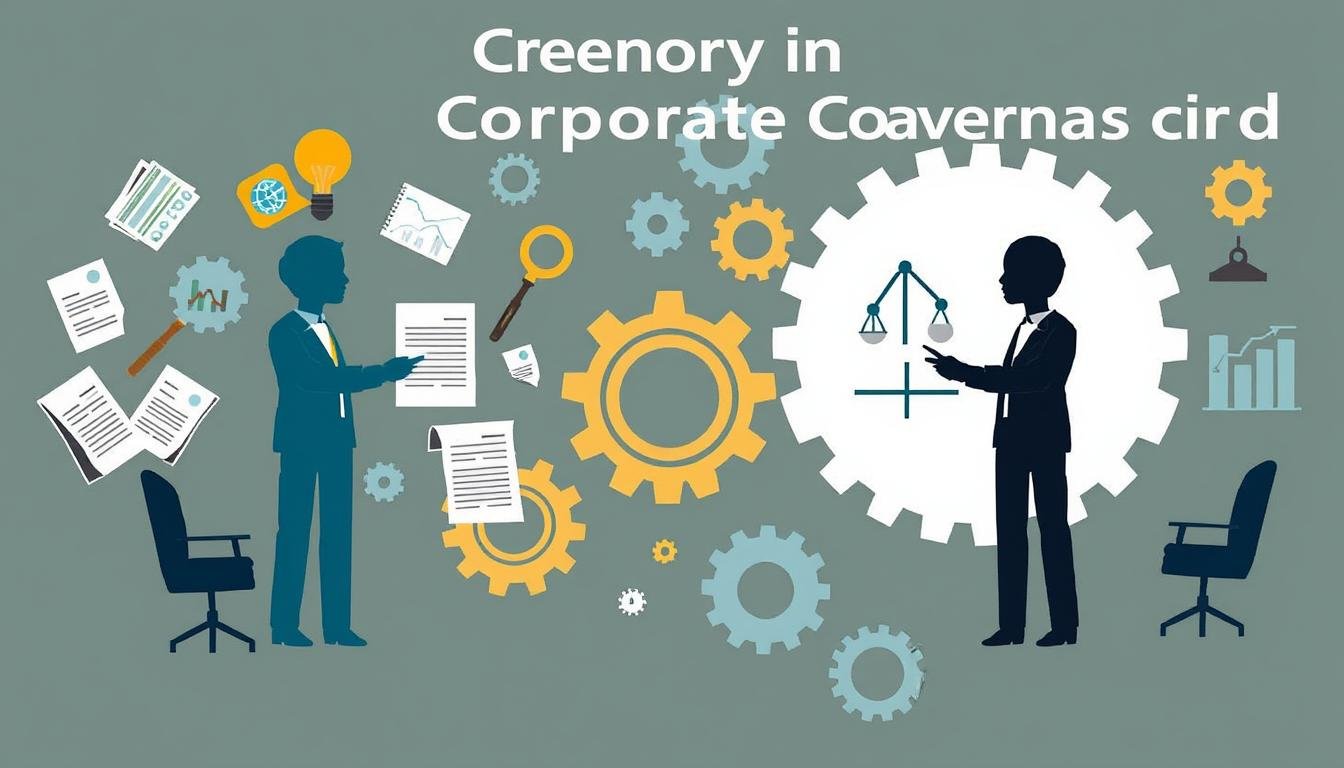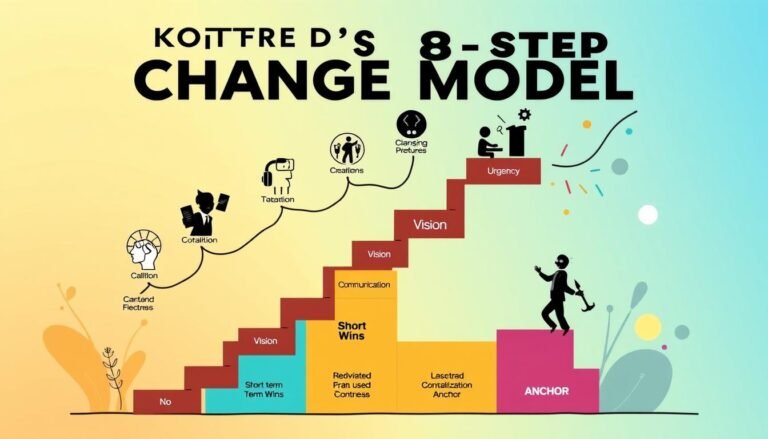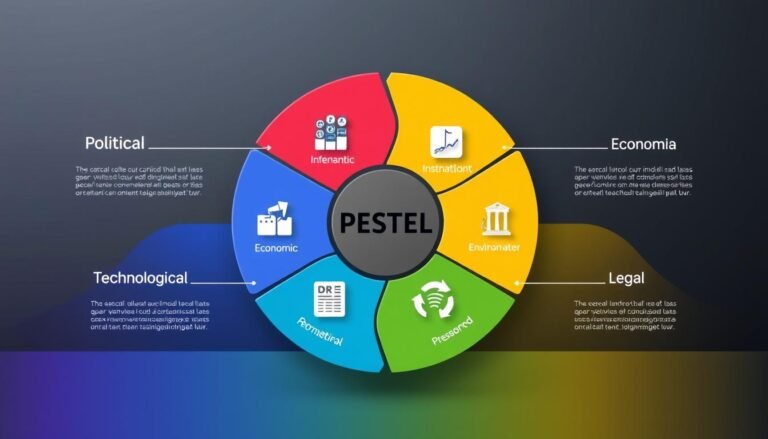Understanding Agency Theory in Corporate Governance
Have you ever thought about how shareholders and corporate executives might not always see eye to eye? This is what Agency Theory is all about. It’s a key idea in corporate governance that looks into the complex relationship between those in charge and those who make decisions. When not managed well, this relationship can cause big financial problems.
Agency Theory helps us understand the issues that come up when people who own a company, the principals, depend on others, the agents, to make decisions for them. These issues can take many forms. They offer a great chance to improve how companies work and make everyone involved happier. By using good governance, we can make sure that those acting on behalf of others do what’s best for them.
Key Takeaways
- Misalignment of interests can lead to severe inefficiencies and financial losses for companies.
- The principal-agent problem stems from conflicting interests between principals and agents.
- Effective corporate governance provides rules and incentives to alleviate the principal-agent problem.
- Agency loss increases when agents deviate from the interests of the principals.
- Transparency and similar goal orientation between parties can significantly reduce agency loss.
What Is Agency Theory?
Agency theory helps us understand the complex world of the principal-agent relationship. It shows how agents might not always act in the best interest of those they represent. This can lead to agency conflict, especially when making financial decisions.
Defining the Principal-Agent Relationship
The principal-agent relationship is key in agency theory. It appears in many areas, such as:
- Shareholders and company managers, where managers act for shareholders.
- Investors and fund managers, where fund managers put investors’ interests first.
- Employers and employees, where employees should work for their employers’ benefit.
These relationships can cause agency conflicts because of different goals and information gaps. These conflicts affect financial decisions and how well things run.
Key Takeaways of Agency Theory
Agency theory teaches us a few important things:
- People usually act in their own best interest, which can cause moral hazard if agents use their knowledge to their advantage.
- Agency loss is the potential losses principals face because of agents’ actions that don’t match their goals.
- To reduce agency loss, offering performance-based rewards to agents helps. Sometimes, firing agents who don’t meet expectations is also necessary.
The Principal-Agent Problem and Its Implications
The principal-agent problem happens when one person, the agent, makes decisions for another, the principal. This can cause big problems, especially if their goals and how they handle risks are different. For example, corporate CEOs might choose personal benefits over what’s best for shareholders, like in high-risk projects.
Understanding Agency Conflict
Agency conflict means the agent’s actions don’t help the principal. Differences in how they handle risks make this worse. Shareholders might want to keep their investments safe, but CEOs might pick risky options for big bonuses. This leads to more agency loss, which is the extra costs when the agent’s choices don’t match the principal’s goals.
Examples of Principal-Agent Relationships
Principal-agent issues are found in many areas. Here are some examples:
- The relationship between shareholders and corporate managers, where incentives may be misaligned.
- Clients and financial planners, where planners may not always prioritize client needs, leading to agency loss.
- Homeowners interacting with local governments or real estate agents, exposing conflicts of interest.
To fix these issues, good governance is key. Small changes, like how we evaluate performance and design contracts, help keep agents focused on what the principal wants. Things like stock options and sharing profits can also make sure everyone’s goals are in line, reducing the problems of the principal-agent issue.
Agency Theory in Corporate Governance
Agency theory is key in shaping corporate governance. It looks at the relationship between agents and principals. It helps companies set rules to manage stakeholder relationships and reduce conflicts of interest. Knowing how agency theory guides corporate policies is vital for good management and making strategic decisions.
How Agency Theory Shapes Corporate Policies
Agency theory shapes corporate policies by making sure agents are accountable to principals. These policies aim to match executives’ interests with those of shareholders. Important parts include:
- Performance-based incentives: Pay tied to company success motivates executives to aim for shareholder goals.
- Transparency: More reporting helps clear up information gaps between managers and owners.
- Board oversight: Having independent directors strengthens management control and keeps decisions in line with long-term goals.
Importance of Incentives in Alleviating Agency Loss
Managerial incentives are key in reducing agency loss by making sure executives act for shareholders’ benefit. Good pay structures can lessen conflicts from self-interest. Strategies include:
- Equity-based pay: Stock options make managers focus on long-term growth.
- Performance metrics: Clear financial goals help measure how well managers are doing.
- Clawback provisions: Rules to take back bonuses in cases of misconduct or financial restatements boost accountability.
Addressing Agency Costs and Information Asymmetry
Dealing with agency costs and reducing information gaps is key for good corporate governance. Agency costs happen when there’s a mismatch between what agents and principals want, causing inefficiencies and losses. For example, Enron’s 2001 bankruptcy showed how these issues can lead to huge financial losses, wiping out $74 billion in shareholder value.
To make things clearer, companies can use different strategies to lessen information gaps. One good way is to make top executives and board members own company stock. This makes their goals match those of shareholders, pushing for better performance. Apple is a great example of this, showing how personal investment can stop actions that harm stakeholders.
Control mechanisms are vital to fight moral hazards in agency relationships. Paying executives based on how the stock price does helps match their goals with shareholders’. This approach boosts accountability and cuts down on agency issues by making agents act right. Also, the risk of being fired or facing a hostile takeover motivates managers to work well.
Reputation is key in markets with limited info and trust. Things like corporate culture and groups like the Better Business Bureau help coordinate actions and build trust. Rules, like the Fiduciary Rule, protect investors by reducing conflicts and making sure financial advisors work for their clients.
Conclusion
Agency theory is key to understanding how companies work. It shows us the complex relationships between leaders and their teams. It helps us see how different goals can cause problems within a company.
By tackling agency costs and promoting openness, companies can make sure everyone works towards the same goals. This makes sure the company does well. Agency theory also helps different types of businesses, like finance and sociology, work better and make their customers happier.
Using agency theory in business helps solve conflicts and builds a culture of responsibility and high performance. These ideas are more important today, as making good decisions depends on understanding these complex relationships.
Source Links
- What Is the Role of Agency Theory in Corporate Governance?
- What Is Agency Theory?
- Agency Theory
- What is Agency Theory in Business?
- Agency Theory: Definition, Examples of Relationships, and Disputes
- Agency Theory in Outsourcing
- Principal-Agent Problem Causes, Solutions, and Examples Explained
- Principal–agent problem
- Agency Theory In Corporate Governance – fintelligents
- Agency and Corporate Governance
- How Do Modern Corporations Deal With Agency Problems?
- Agency Problem: Definition, Examples, and Ways To Minimize Risks
- Agency Theory: An Assessment and Review
- Agency Theory; A Summary of Kathleen Eisenhardt Review







